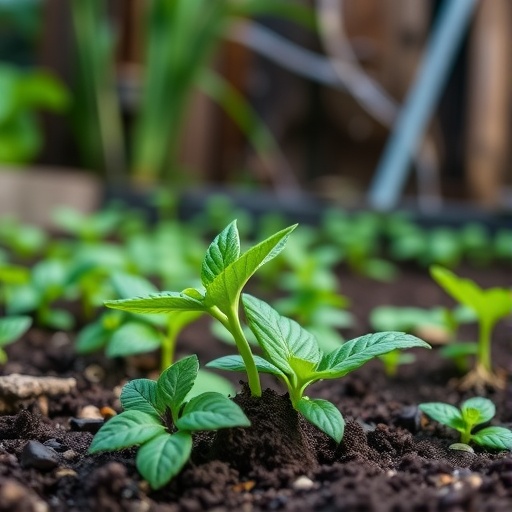Researchers led by Song et al. have conducted a groundbreaking study addressing the rising concerns surrounding agricultural waste management and the associated environmental hazards. Their investigation focuses specifically on the composting of pig manure, a common yet significant waste product in the livestock industry. With increasing attention to the sustainability of farming practices and the need for efficient waste recycling, this study presents innovative methods to not only improve the quality of compost derived from pig manure but also highlights critical implications regarding the bioavailability of cadmium (Cd) in the compost.
The authors aimed to enhance the composting process by substituting traditional insoluble carbon sources with easily degradable organic carbon. This shift is anticipated to boost microbial activity and accelerate the decomposition of organic materials, which is vital to producing high-quality compost. Through their research, the team observed that incorporating easily degradable organic carbon dramatically improved the overall quality of the compost. This has profound implications for both agricultural productivity and soil health, as robust compost can rejuvenate nutrient-deficient soils, enhancing crop yields.
However, the researchers also uncovered a concerning side effect of this approach: increased bioavailability of cadmium—a toxic heavy metal commonly found in agricultural soils due to pollution and industrial activities. While the enhanced compost quality can offer significant benefits, the presence of cadmium poses substantial risks, especially in areas where agricultural runoff contaminates soil and water sources. This duality presents a significant challenge for farmers and agricultural policymakers.
The study emphasizes the importance of finding a balance in compost formulation. As carbon sources in compost significantly influence microbial dynamics, researchers advocate a carefully considered approach to integrating various organic materials. While easily degradable organic carbon improved compost quality, it inadvertently increased the potential leaching of cadmium, raising concerns about food safety. The potential upward trend in cadmium levels could significantly impact human health, especially in regions where the soil is already burdened with heavy metals.
Examining the composting process utilized, the research pointed to the role of microorganisms in breaking down organic materials. Microbial populations thrive on easily degradable organic matter, resulting in enhanced nutrient cycling and the production of stable compost products. However, the study highlights the need for continuous monitoring of contaminants like cadmium to mitigate adverse health effects. This indicates the necessity for implementing stringent regulations and best practices when utilizing pig manure in agricultural settings.
In light of these findings, farmers are encouraged to adopt a more informed approach to composting. Understanding the composition of their compost materials can lead to better management practices and greener farming. It also opens the door for further research on biodegradable alternatives and soil amendments that could potentially displace harmful elements in composting scenarios.
Ultimately, this study by Song et al. brings to light a crucial conversation about sustainability in agriculture. While improving compost quality is imperative, ensuring the safety and health of food systems cannot be overlooked. Addressing this issue will require collaboration among researchers, agricultural extension services, and farmers to develop effective solutions. The findings serve as a reminder of the complex interdependencies in agricultural ecosystems, reinforcing the need for a holistic approach to farming practices.
Moreover, the implications extend beyond local farms; they resonate throughout global food systems. As we grapple with issues such as climate change, soil degradation, and the health impacts of heavy metals, understanding the output of agricultural waste management processes becomes increasingly urgent. Innovation in composting techniques, such as those proposed in this study, might lay the groundwork for developing more sustainable agricultural practices worldwide.
In conclusion, Song et al.’s research not only sheds light on the intricate balance of compost quality and soil contamination but also underscores the ongoing need for sustainable waste management strategies. While enhancing compost quality via organic carbon substitution holds promise, the heightened risks associated with cadmium contamination cannot be ignored. The agricultural community must take proactive steps in embracing this knowledge, ensuring that improvements do not come at the cost of public health.
Through sustained efforts, there remains hope for creating sustainable agricultural practices that prioritize both productivity and the safety of our ecosystems. Scientific advancements like those made by Song et al. propel us toward a future where farming is not only economically viable but also environmentally sound, fostering healthier ecosystems for generations to come.
Subject of Research: Composting of pig manure and impacts on compost quality and cadmium bioavailability.
Article Title: Improving pig manure compost quality but increasing bioavailability of Cd by substituting insoluble carbon with easily degradable organic carbon.
Article References:
Song, D., Zhao, L., Hao, X. et al. Improving pig manure compost quality but increasing bioavailability of Cd by substituting insoluble carbon with easily degradable organic carbon. Discov Sustain 6, 1275 (2025). https://doi.org/10.1007/s43621-025-02173-x
Image Credits: AI Generated
DOI: https://doi.org/10.1007/s43621-025-02173-x
Keywords: compost quality, pig manure, organic carbon, cadmium bioavailability, sustainable agriculture.




